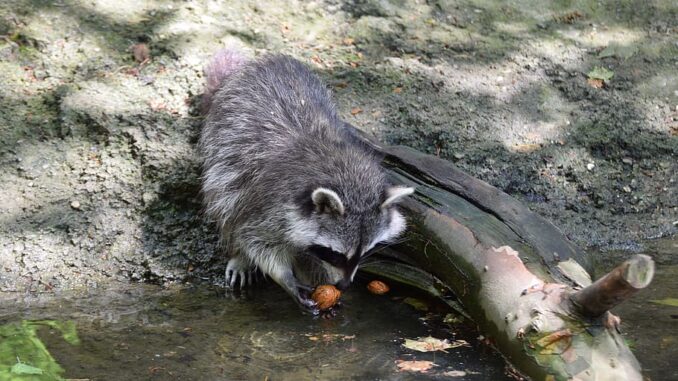
Ever wondered why raccoons have a peculiar habit of washing their food? This behavior, observed in these clever and adaptable creatures, has intrigued many.
When raccoons forage for food, they often dip their hands into water sources such as streams, ponds, or puddles, and then rub or roll the food item between their wetted hands. This behavior is believed to be tactile sensitivity, allowing them to better feel and manipulate their food. It could also be a way to mimic the act of washing or softening their food, particularly if it’s a hard object like a shell or insect exoskeleton.
Interestingly, raccoons are scientifically known as Procyon lotor, a name that curiously translates to the “washing bear”.
Table of Contents
Do Raccoons Wash Their Food
No, raccoons don’t actually wash their food like humans do. The behavior commonly referred to as “washing” is more accurately described as “dousing” or “rolling.” Raccoons dip their hands into water sources and then rub or roll their food between their wetted paws.
This behavior is believed to enhance their tactile sensitivity, helping them better feel and manipulate their food. It may also serve to soften hard items in their diet, such as nuts or insect exoskeletons.
While the term “washing” is a bit misleading, this behavior showcases the resourcefulness and adaptability of raccoons in dealing with a variety of food sources.
Why Do Raccoons Wash Their Food
Tactile Sensitivity Enhancement
Raccoons have a lot of nerves in their paws. When they dip their hands in water and touch their food, it enhances their sense of touch. It’s like turning up the sensitivity on their fingertips, helping them better feel and handle different types of food.
Imagine a raccoon using water to enhance its sense of touch is like how a person might use their hands to feel an object in the dark. When you’re in the dark and want to understand the shape and texture of something, you rely more on your sense of touch.
Similarly, when a raccoon dips its paws into water, it’s like turning up the sensitivity on its “touch receptors.” This helps the raccoon gather more information about the food it’s handling.
Softening Hard Food
Sometimes raccoons eat things that are tough, like nuts or bugs with hard shells. When they wet their food by rolling it in water, it becomes softer. This makes it easier for them to bite and eat, especially when dealing with items that might be difficult to chew.
Mimicking Washing Behavior
In places where raccoons live near humans, they often find water sources like ponds or streams. When they dip their paws into the water and rub their food, it might look a bit like washing. This behavior could be a mix of using available water sources and learned habits in environments close to people.
Are Raccoons Hygenic?
Raccoons are not considered hygienic animals, as they often explore trash and may even consume unsanitary items like dog faeces. A study conducted by the Zoological Society of London observed raccoon behavior, revealing that food items, including earthworms, deemed in need of washing, were not washed at all. This highlights that their washing habit should not be confused with hygiene, as raccoons display opportunistic scavenging behaviors that may expose them to unclean conditions.
What is Dousing?
Dousing, in the context of raccoons, refers to a behavior where raccoons dip their hands or food into water, and then rub or roll the items between their wetted paws. This behavior is often colloquially referred to as “washing” their food, but it’s more accurately described as dousing or rolling.
Contrary to the perception of cleaning, the primary purposes of dousing are thought to be enhancing tactile sensitivity and, in some cases, softening certain food items. Raccoons engage in this behavior as a part of their foraging habits, particularly in dealing with a diverse range of foods in their diet.
Frequently Asked Questions (FAQs) About Why Raccoons Wash Their Food:
Q1: Do all raccoons wash their food before eating?
A: No, not all raccoons engage in the behavior of washing their food. While some raccoons exhibit the habit of dousing or rolling their food in water, it varies among individuals. Factors like the type of food and the environment can influence whether a raccoon chooses to wash its food.
Q2: Is it true that raccoons always wash their food?
A: No, it’s a myth that raccoons always wash their food. While the behavior of washing, or dousing, is observed in some raccoons, it is not a universal practice. Raccoons are adaptable creatures, and their approach to handling and consuming food can vary based on their individual preferences and environmental factors.
Q3: Why do raccoons wash their food?
A: Raccoons may wash their food as a way to enhance their tactile sensitivity. By wetting their paws, they improve their ability to feel and manipulate different types of food. Additionally, this behavior might help soften hard or tough items in their diet, making them more palatable.
Q4: How does washing food contribute to raccoons’ survival in the wild?
A: Washing food can contribute to a raccoon’s survival by aiding in the identification of safe and suitable items to eat. In the wild, raccoons have a diverse diet, and being able to gather more information about their food through enhanced touch sensitivity can be crucial in avoiding potential dangers or toxins.
Conclusion:
In summary, raccoons engage in the behavior of dousing or rolling their food, often mistaken as washing. Despite their scientific name, Procyon lotor, meaning the “washing bear,” this habit serves practical purposes such as enhancing touch sensitivity and softening certain foods.
Raccoons’ adaptability and resourcefulness in their foraging methods highlight their ability to thrive in various environments, challenging the common perception of cleanliness associated with their name. Understanding the nuances of their behavior provides valuable insights into the dynamic lives of these clever and opportunistic creatures.
